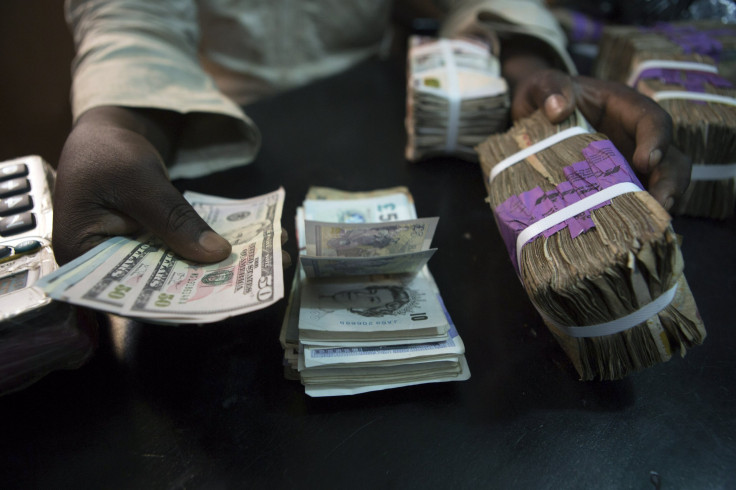Nigeria's Naira Currency Falls To Record-Lows Against Dollar Amid Foreign Exchange Scarcity

Nigeria’s currency fell to record-lows against the dollar Monday, as Africa’s largest oil producer faces its worst financial crisis in years. The naira exchanged 345 to the dollar and 485 to the British pound, a depreciation of 20 and 45 in the parallel markets respectively, according to Nigerian newspaper Vanguard.
Bureaux de Change officials attributed Monday’s sharp decline to increasing scarcity of dollars and pounds in the market. There is currently a strong demand for dollars and foreign exchange from importers amid diminishing liquidity as the global price of oil – Nigeria’s chief source of revenue -- plummets to all-time lows.
“The market is experiencing huge demand for dollars but there is no supply. Even those who have dollars are not willing to sell. The way things are going, the rate might reach 250 naira per dollar before it stabilizes,” a Bureaux de Change operator in the capital Abuja told Vanguard, speaking on condition of anonymity.
The naira currency has shed at least 25 percent of its value in the past year. The Central Bank of Nigeria last devalued the currency by 8 percent in November 2014 and fixed the official exchange rate at an even lower 198 to the dollar, although it sells at 222 at exchange bureaus. Rather than depreciate the naira again, the bank has restricted access to foreign currency and banned a long list of imports, a move that is “quite detrimental,” according to International Monetary Fund’s Africa director Antoinette Sayeh.
“Those restrictions on those products are already making it harder for the average person to buy milk or to buy milk at an affordable price,” Sayeh said at the IMF annual meeting in Peru in October, according to the Associated Press. She urged a review of the restrictions and for officials to “permit the exchange rate to continue to adjust.”
Nigerian President Muhammadu Buhari has resisted the IMF’s calls to devalue the naira currency – a tactic that has helped other African nations cope with economic stress. Instead, the former military ruler has proposed a record budget for the 2016 fiscal year, while Nigeria's central bank has tried to prop up the failing naira to stem market panic.
The oil-rich nation has seen a continuous deceleration of economic growth since last year as the global crude price dropped a whopping 35 percent amid an oversupplied market. GDP growth rate for Nigeria fell from 6.23 percent in the third quarter of 2014 to 2.35 percent in the second quarter of 2015. The Monetary Policy Committee of the Central Bank of Nigeria warned in October that recession is imminent if proactive steps were not taken to revive growth in key economic sectors.
© Copyright IBTimes 2024. All rights reserved.





















